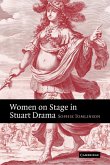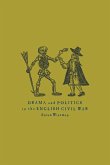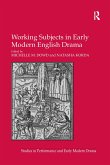Outlines 'scientific' conceptions of racial and ethnic differences in sixteenth- and seventeenth-century English writing.
In English Ethnicity and Race in Early Modern Drama, Mary Floyd-Wilson outlines what we might call 'scientific' conceptions of racial and ethnic differences in sixteenth- and seventeenth-century English writing. Drawing on classical and contemporary medical texts, histories and cosmographies, Floyd-Wilson demonstrates that Renaissance understandings of racial and ethnic identities contradicted many modern stereotypes concerning difference. Southerners, Africans, in particular, were identified as dispassionate, cool-tempered and wise, whereas the more northern English were understood to be unruly, impressionable and slow-witted. Concerned with the unflattering and constraining implications of this classically derived knowledge, English writers laboured to reinvent ethnology to their own advantage - a labour that paved the way for the invention of more familiar racial ideas. Floyd-Wilson highlights these English revisionary efforts in her surprising and transformational readings of the period's drama, including Marlowe's Tamburlaine, Jonson's The Masque of Blackness and Shakespeare's Othello and Cymbeline.
Review quote:
"Making a contribution of the highest interest and importance to the growing field of early modern race studies, this book expands the scope of current inquiry by approaching from a new angle....Floyd-Wilson's complicated, multi-faceted argument challenges us to keep all of its strands in view. Her emphasis on transition makes her interpretive stance dynamic and far-reaching."
Renaissance Quarterly
"Mary Floyd-Wilson's study of English ethnicity offers an important contribution to the study of race in the early modern period. Its account of geohumoral ethnology is innovative and fascinating."
Seventeenth-Century News
Table of contents:
List of illustrations; Acknowledgements; Introduction: the marginal English; Part I. Climatic Culture: The Transmissions and Transmutations of Ethnographic Knowlege: 1. The ghost of Hippocrates: geohumoral history in the West; 2. British ethnology; 3. An inside story of race: melancholy and ethnology; Part II. The English Ethnographic Theatre: 4. Tamburlaine and the staging of white barbarity; 5. Temperature and temperance in Ben Jonson's The Masque of Blackness; 6. Othello's jealousy; 7. Cymbeline's angels; Notes; Index.
Hinweis: Dieser Artikel kann nur an eine deutsche Lieferadresse ausgeliefert werden.
In English Ethnicity and Race in Early Modern Drama, Mary Floyd-Wilson outlines what we might call 'scientific' conceptions of racial and ethnic differences in sixteenth- and seventeenth-century English writing. Drawing on classical and contemporary medical texts, histories and cosmographies, Floyd-Wilson demonstrates that Renaissance understandings of racial and ethnic identities contradicted many modern stereotypes concerning difference. Southerners, Africans, in particular, were identified as dispassionate, cool-tempered and wise, whereas the more northern English were understood to be unruly, impressionable and slow-witted. Concerned with the unflattering and constraining implications of this classically derived knowledge, English writers laboured to reinvent ethnology to their own advantage - a labour that paved the way for the invention of more familiar racial ideas. Floyd-Wilson highlights these English revisionary efforts in her surprising and transformational readings of the period's drama, including Marlowe's Tamburlaine, Jonson's The Masque of Blackness and Shakespeare's Othello and Cymbeline.
Review quote:
"Making a contribution of the highest interest and importance to the growing field of early modern race studies, this book expands the scope of current inquiry by approaching from a new angle....Floyd-Wilson's complicated, multi-faceted argument challenges us to keep all of its strands in view. Her emphasis on transition makes her interpretive stance dynamic and far-reaching."
Renaissance Quarterly
"Mary Floyd-Wilson's study of English ethnicity offers an important contribution to the study of race in the early modern period. Its account of geohumoral ethnology is innovative and fascinating."
Seventeenth-Century News
Table of contents:
List of illustrations; Acknowledgements; Introduction: the marginal English; Part I. Climatic Culture: The Transmissions and Transmutations of Ethnographic Knowlege: 1. The ghost of Hippocrates: geohumoral history in the West; 2. British ethnology; 3. An inside story of race: melancholy and ethnology; Part II. The English Ethnographic Theatre: 4. Tamburlaine and the staging of white barbarity; 5. Temperature and temperance in Ben Jonson's The Masque of Blackness; 6. Othello's jealousy; 7. Cymbeline's angels; Notes; Index.
Hinweis: Dieser Artikel kann nur an eine deutsche Lieferadresse ausgeliefert werden.








